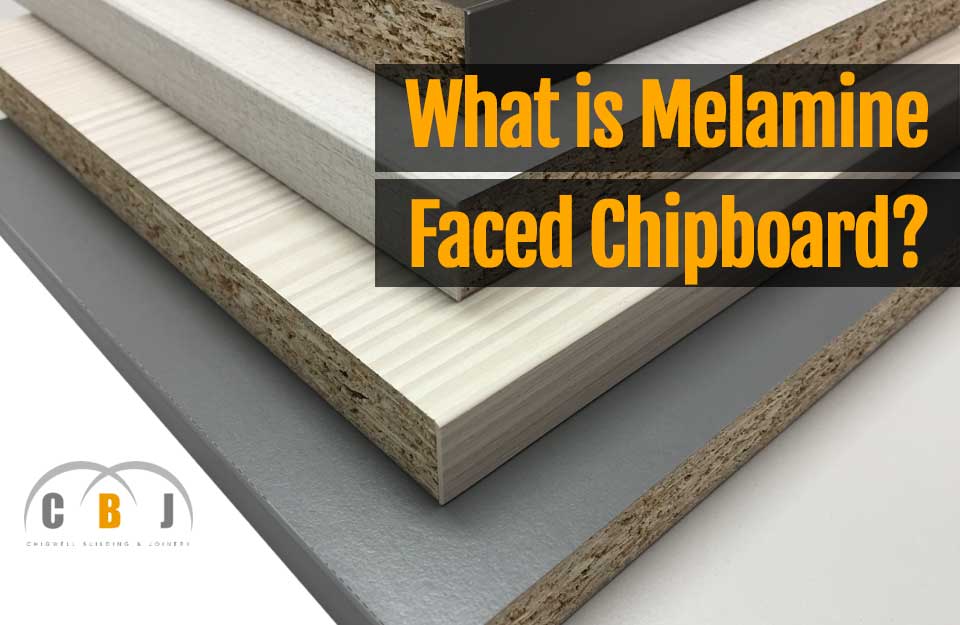
What is Melamine Faced Chipboard?
Author Chigwell Building & Joinery
Date 07/10/21
Melamine faced chipboard is commonly used due to its affordability and practicality.
However, you may not be aware of what it is made from, and what the main properties that make it ideal for certain uses.
Let us delve a bit deeper into these factors hereunder.
Read on to find out more, or use a jump link below to skip to a desired chapter:
Table of Contents
- What is MCF?
- Where is Melamine Faced Chipboard Used?
- MFC vs MDF
- Is Melamine Faced Chipboard Sustainable?
- Advantages of MFC
- Conclusion
What is MCF?
Melamine faced chipboard, or MCF, is a composite wood.
It is made by combining machined wood chips together with a strong resin.
Hence it is an engineered wood product.
Melamine is a thermosetting plastic which is applied to paper.
This is then glued onto the chipboard, so that it achieves its final look.
High pressure heat bonding is also used to impregnate the paper to the particleboard.
This makes it more durable, and in some cases it is also water resistant.
MCF comes in various types, including sizes, thicknesses and colours.
Where is Melamine Faced Chipboard Used?
Melamine faced chipboard is used in countless ways - from household furniture to commercial uses.
You can find it in kitchen cupboards, wardrobes, shop furniture and much more!
Kitchen Cabinets
MFC is great for kitchen cabinets as it is water resistant.
This is an important attribute for kitchens where there is a considerably high level of moisture.
MFC is also ideal for kitchen cabinets because it is scratch resistant.
While storing pots, pans, plates and other kitchen stuff it is normal to scrape along the interior of the cabinets.
However MFC shelves will not be damaged or scratched as easily as other materials.
Another advantage of MFC is the fact that it can be cleaned very easily.
This is important for a kitchen, where spills and stains are common.
Simply wiping down the surface with water mixed with some disinfectant will leave the kitchen cabinets in great condition, as well as more hygienic easily.
Shelves
MFC is ideal for shelves as it is available in so many different thicknesses and colours.
So it is easy to choose one that can complement the rest of your furniture.
It can also be cut easily according to your particular requirements.
It is very versatile and considerably sturdy.
Also, if you place anything that could scratch you won’t need to worry as MFC is a scratch resistant material.
Wardrobe Carcasses
MFC is often used for wardrobe carcasses to reduce the total cost of manufacturing the wardrobe.
The outer parts will be made of other types of wood or thicker boards.
But MFC boards are commonly used to create the carcass as it is very versatile and affordable.
Since it is also not that heavy it is easier to work with it too.
MFC vs MDF
MFC and MDF are commonly thought to be the same, but in reality there are a number of differences, despite several similarities.
MDF stands for medium density fibreboard.
It is basically made from wood waste and it is highly versatile.
The various pieces of wood are glued up together using high heat and pressure.
Resin is also used to bind them.
MDF has a smooth texture and it is quite resistant to moisture.
As noted earlier, MFC stands for melamine faced chipboard, and while it is versatile, it is somewhat weaker than MDF.
Having said that, with recent improvements the durability and resistance of MFC has increased considerably.
It is a stable material which is used to make thick carcasses, kitchen cabinet interiors, and several kinds of furniture.
When it comes to stability, both MFC and MDF are quite stable, but MFC is considered to be better.
MFC is also better than MDF when it comes to safety considerations.
This is due to the fact that MDF can release dangerous particles while being cut.
Studies have shown that it contains a carcinogenic element, namely formaldehyde which can remain airborne for some time while cutting or if the material gets damaged.
While manufacturers may seal furniture to reduce this concern, it’s important to bear this in mind, while also noting that MFC does not have any such safety issues at all.
MDF is however easier to cut and to shape than MFC.
So when it comes to ease of use and versatility, MDF is a better option.
All in all, both materials are strong and resistant, and considerably long lasting.
They are also affordable when compared to other kinds of wood, and easy to use.
Is Melamine Faced Chipboard Sustainable?
When it comes to sustainability MFC is fairly good.
This is because a good part of MFC is made from wood that comes from trees that are found in sustainable forests.
The rest comes from high quality recycled waste wood.
All in all, if more furniture is made from MFC, fewer trees will need to be cut down in relation to solid wood.
Advantages of MFC
MFC has several positive attributes, which make it so popular:
- It does not require any finishing or treatment, such as other kinds of wood.
- It is lightweight, and so easier to work with, and to transport and handle it.
- Despite being lightweight, it is hard wearing.
- This material is also considerably scratch resistant, and this improves the item’s longevity.
- It is heat resistant and water resistant.
- Comes in so many different colours and styles, which offers room for choice.
- It is relatively affordable, especially when one needs to use a lot of boards or sheets.
- It is easy to maintain and to clean.
- It is an eco-friendly material since it is mainly made from wood waste and scraps of lumber products such as wood chips, shavings and sawdust, which would otherwise have been thrown away.
- The smooth and flat surface makes it ideal to stick decorative laminate or wood veneer.
Conclusion
By now you should be better able to appreciate the various advantages of MFC.
Everything considered, it is a good idea to opt for this material as you can save money and have a good quality piece of furniture.

